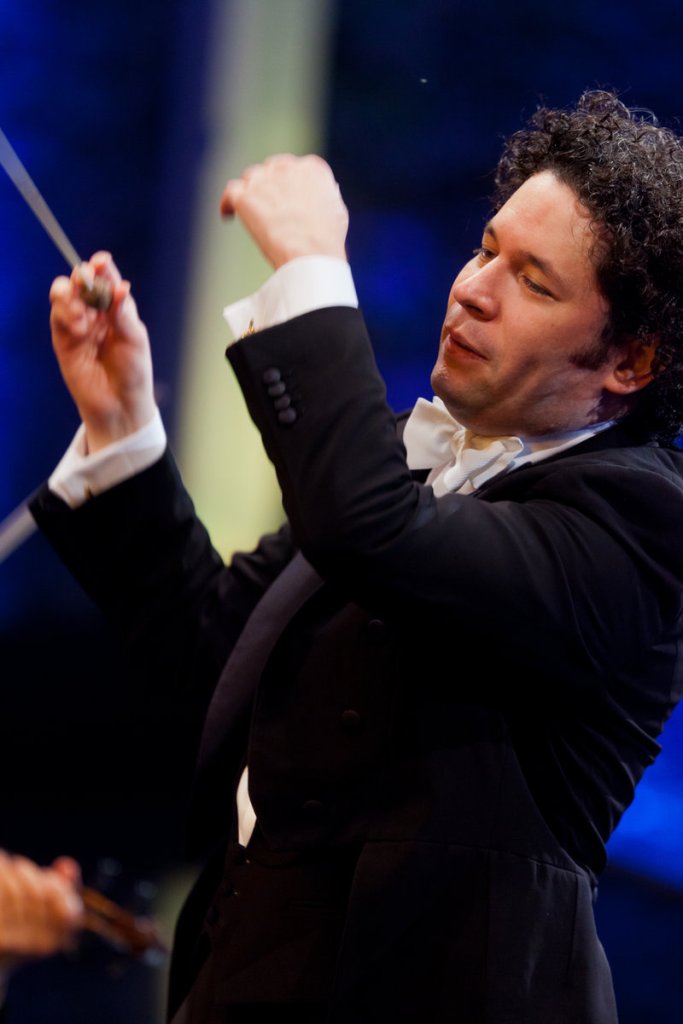I have been writing a lot lately about Stravinsky’s “Rite of Spring” on the 100th anniversary of its premiere, but I had to go far away to hear a truly definitive performance, arguably the best of the century.
We were in Buenos Aires last week and wanted to hear a concert at the Teatro Colon, a landmark of the city similar to La Scala but on a much grander scale. The clerk at the box office said that the next event, the first concert of a South American tour by the Bolivar Symphony Orchestra under Gustave Dudamel, had been sold out for some time.
We returned on the night of the concert, which was to start at the civilized hour of 8:30 p.m., in hope of finding a scalper. There were none, but we started talking with a gentleman in line whose father had received his engineering degree from the University of Maine. He had reserved a box — six seats and two benches — for his family, and was able to fit one more person into the space.
The orchestra, when it filed in section by section, was huge: About 200 members, none of whom was over the age of 28. Dudamel, who also conducts the Los Angeles Philharmonic, is 31.
From the first bar of “The Rite of Spring,” it was obvious that something extraordinary was taking place. Ever since “Fantasia,” it had never been clear to me what a towering masterpiece Stravinski had achieved.
Now it was revealed in all its splendor, like a huge Cubist painting, with brush strokes ranging from the most subtle woodwind shading to violent color contrasts, all perfectly delineated.
The orchestra, which has the strongest string section I have ever heard (including the Philadelphia under Ormandy), was able to go from fortissimo to pianissimo in an instant — and, even more difficult, to generate startling moments of silence after the full force of drums and trumpets.
Everything about the performance was superb, but its most notable characteristic was the energetic liveliness of the players, verging on a violence entirely appropriate to “The Rite of Spring.” The pulsing rhythms were almost unbearably intense.
I hope I’m not damning the Bolivar with faint praise. It was a once-in-a-lifetime musical experience.
The audience liked it too. Following an equally powerful performance of Revueltas’ “La noche de los Mayas,” a piece with striking similarities to “The Rite of Spring,” it demanded an encore and received four. Two of them were Wagnerian chestnuts polished to a high gloss. The string section was even able to overcome Wagner’s weak orchestration.
The orchestra members and their conductor are graduates of what the Venezuelans call “Il Sistema,” a program founded in 1975 that offers children from the worst slums an education in classical music. It has changed many lives for the better, and is still in full force.
As for its music education techniques, if the Bolivar Orchestra is any indication, Juilliard should send a team down for pointers.
Il Sistema also has relevance to Maine, where it appears that severe cuts are to be made in the University of Southern Maine’s fine music program. It would do the state more good, economically and culturally, to increase the staff and broaden its outreach.
Christopher Hyde is a writer and musician who lives in Pownal, He can be reached at:
classbeat@netscape.net
Send questions/comments to the editors.



Success. Please wait for the page to reload. If the page does not reload within 5 seconds, please refresh the page.
Enter your email and password to access comments.
Hi, to comment on stories you must . This profile is in addition to your subscription and website login.
Already have a commenting profile? .
Invalid username/password.
Please check your email to confirm and complete your registration.
Only subscribers are eligible to post comments. Please subscribe or login first for digital access. Here’s why.
Use the form below to reset your password. When you've submitted your account email, we will send an email with a reset code.